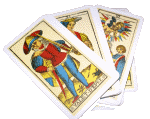
Bohemian Gothic Tarot
THREE OF SWORDS
Lighter or more conventional meanings
Hurt and grief, usually over a relationship * Feeling betrayed * Sorrow and loss, usually over a person who is loved * Pain over a the failure of a sexual partnership or a passionate friendship.Darker, shadow or more hidden meanings
A desire for revenge after a relationship ends * Feeling unable to get over your anger after a betrayal * An inability to "move on" after a partnership or friendship finishes * Dwelling on past loves, becoming unhealthily obsessed by them.A sad and dejected-looking woman stands in what seems to be a graveyard - the stones in front of her show a scene of one dove mourning another (doves are famous symbols of fidelity) and also a relief carving of a heart pierced with an arrow. The symbolism implies a death or loss and the expression of the woman would seem to confirm this. Yet the woman is not dressed in the classic black garments of full mourning and although she is young and delicately beautiful, there is something disturbingly intense about her gaze. She looks obsessional, as well as both angry and sad. Her stare is heavy-lidded and dark, and as we look at her we wonder what tragedy has taken place, and what part she played in it.
Gothic films and literature are full of tragic or doomed love affairs. In some tales, for example Henry James' "Sir Edmund Orme" the spurned lover comes back to haunt the object of his desires. In others, an illicit love affair leads to horror and betrayal; le Fanu's "The Evil Guest" is centred on one such incident. Then there are the ill-matched couples, of which Rochester and his first wife Bertha are the Most classic example (Charlotte Bronte, Jane Eyre). Then there are the forbidden, incestuous desires - the love of Roderick Usher for his sister Madelaine (Edgar Allan Poe, "The Fall of the House of Usher") and, arguably, of Heathcliff for his adoptive sister Catherine (Emily Bronte, Wuthering Heights) are particularly Powerful and memorable examples.
The Three of Swords is a card about heartbreak and so it often (though not always) refers to an affair or romance that ends badly. There is an air of finality about its meaning; it rarely indicates a relationship that is just going badly, it's far more often about the pain of a love that's over. The Bohemian Gothic card emphasises this aspect, the dead dove is an unmistakeable symbol and the red stain on the stone speaks of both passion and possible violence. What we see here is a kind of death; of trust, affection, rapture and joy. It's a bleak card, full of pain which on first encounter seems to have no redeeming features. But this card does, at the very least, help us to acknowledge and confront the fact that we all meet disappointment and unhappiness in our lives at times. There is a starkness and directness to the Three of Swords that helps us to recognise that this is a shared experience, something we all go through.
When this card comes up in a reading it's time to ask some serious questions about the nature of what's happened and to what extent the querent was victim or perpetrator. Is she (or he) an innocent who has been wronged, or should she shoulder some of the responsibility? It's also important to consider the best ways to get through the situation, whatever the rights and wrongs of how it came about. It could well be best to grin and bear it, or there could be some sort of action (perhaps a reconciliation meeting or just a letter to say good-bye in the right way) that might help. We should also consider whether professional advice is necessary. In the end, we all know that we do get through these times of heartbreak and the pain does lessen. This card may be an important step in allowing us to recognise and deal with what's happened.
Some further ways to consider this card
Why is this woman not wearing mourning? Is she a mistress rather than a widow or a family member - and so not able to mourn openly? Look at her expression. What do you imagine she is thinking or remembering? Compare this card with the Nine of Pentacles, which also shows a woman with doves. What are the stories of these two very different figures? Could they be linked?"In God's name who is he - what is he?"
"He's a man I wronged."
"How did you wrong him?"
"Oh, awfully - years ago."
"Years ago? Why, he's very young."
"Young - young?" cried Mrs. Marden. "He was born before I was!"
"Then why does he look so?"
She came nearer to me, she laid her hand on my arm, and there was something in her face that made me shrink a little. "Don't you under stand - don't you feel?" she murmured, reproachfully.
"I feel very queer!" I laughed; and I was conscious that my laugh betrayed it.
"He's dead!" said Mrs. Maiden, from her white face.
"Dead?" I panted. "Then that gentleman was-?" I couldn't even say the word.
- Henry James, "Sir Edmund Orme", originally published in the journal Black and white.









